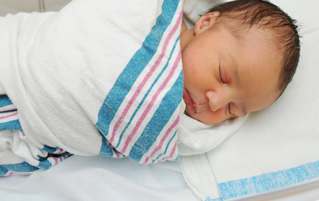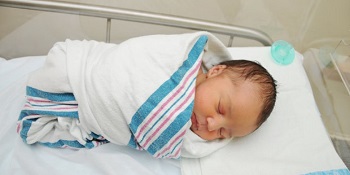5 Really Specific Products You Didn’t Know Were Monopolies

If you need a shovel, or a rope, or a bottle of bleach (just spitballin'), you probably have a preferred location to buy it from, but there are several backup options if that place falls through. Same with just about everything in the world.
Some products, however, are different. For some reason, there's one damn place that has these things figured out, and they're the best at it, period. You're not going to find a knockoff at Costco or Walmart or in the trunk of some guy's Camaro. Nope, these companies figured out their one true purpose in life: to make the best thing that no one else cared enough to perfect.
Baby Blankets
If you haven't yet gone through the all-consuming terror of having a child, let me summarize it for you: If everything goes relatively well, you will watch a smooshed-up life burst forth from your lady's nether regions, and then you're tired forever.
When they bring your little one to you after an intense de-gukking, they'll have it nice and wrapped up like a baby chalupa. If you've spent any time in a hospital delivery area (and who hasn't?), you will likely notice that the thing they wrap the babies in, commonly referred to as a blanket, is oddly similar no matter where you go.
Those pink-and-blue-striped blankets are ubiquitous in hospitals. Hell, when my little girl was born, we couldn't stop them from chucking a barrage of these things at us, even when we headed home. There might be a couple tucked away in my house still. And if you find yourself in a similar situation, you can thank the Medline company, based in a small suburb of Chicago (though the blankets are actually manufactured in Pakistan these days).
This is just where they make the babies.
Medline has had a monopoly since the 1950s, when they first brought their signature style into the world. They've produced about 25 million of them since the '80s alone. Once you throw in numerous washings (what, you didn't think your brand new kid was special enough to get a brand new blanket, right?), that explains why almost every baby born in an American hospital, and countless around the world, have been tucked inside their product. The reason this particular item took off? Simple: the low cost compared to their other models of blankies. Thankfully, most babies aren't fussy about design.
Presidential Shoes
When discussing presidents, there are a lot of physical features that come to mind. Taft was known for his mythical heftiness, LBJ had a tremendous dong, and Zachary Taylor had the best "I'm so over your shit right now" face that has ever graced history:
While most historians spend their time focusing on these silly idiosyncrasies, one company ignored all of that and concerned themselves with presidential feet.
Johnston & Murphy trace their roots back to 1850, when our 13th and greatest president, Millard Fillmore, decided he needed some sweet-ass kicks. You might remember him as the last Whig to hold the highest office in the land, and also the creator of My Two Dads. Thanks, Wikipedia!
The young shoe company must have done a pretty fine job, as they were then enlisted to make just about every single pair of presidential shoes since. They made some killer boots for Abe Lincoln's big-ass feet (which President Obama honored with a similar pair from the company), crafted history's drollest pair of loafers for Gerald Ford to constantly trip over, and even dug into their leftover pimp stock for some blue suede shoes for Bill "Big Willy Style" Clinton.
Johnston & Murphy pride themselves on handmade shoes for the most powerful men on the planet, but they are now facing the prospect of having to provide footwear for a potential female president for the first time in their history. And we're fairly confident that if that happens, they will manage it without any controversy whatsoever.
It's probably safe to say that this company has known our commanders-in-chief more intimately than anyone else around, except maybe Randy Knuckles, presidential proctologist.
Fortune Cookies
Deep down in that nondescript shopping bag of Chinese food, underneath what must be approximately 40 percent of the world's supply of soy sauce, is a magical, cardboard-tasting treat. The mighty fortune cookie promises to lob not only some profound truth at you, but also some numbers on the back that may just open the Lost hatch. Ridiculous, yes, but we crack them open all the same and coyly keep our fortunes to ourselves, comforted that a mixture of butter, flour, sugar, and eggs is keenly aware that we are about to come into a large sum of money.
What group of Chinese soothsayers/pastry makers is responsible for this process?
Well ... no, the Chinese don't really have much to do with fortune cookies at all. They neither make them nor eat them, for the most part. In fact, they're more Japanese than anything. And almost every single fortune cookie you get comes from a single factory in Queens, New York, named Wonton Food, Inc., where they crank out 4 million of those bad boys a day.
Like Willy Wonka and the Chocolate Factory, but with the chance of a brutal beating in the vicinity.
Wonton Food has a database of over 10,000 fortunes, making it even weirder that you keep getting variations of the same message time and time again. Maybe that's because one guy writes them.
There are zero other fortune cookie makers on the East Coast. There's one in the Midwest and one on the West Coast, but no other company comes close to the sheer scale of production and shipping that Wonton Food achieves in the U.S. and overseas. They make fortune cookies around the clock, and the product moves so fast, if they were to quit making them for just a day and a half, they wouldn't have shit left in their inventory. So when you lie back in your chair with the MSG sweats and crack open your fortune, munch on it knowing that, despite all oral evidence to the contrary, you're probably tasting the freshest thing you've ever had in your life.
Body of Christ Wafers
Nestled on a little strip of road near houses and small businesses in northern Rhode Island is an unassuming building that also happens to make 80 percent of the flesh of Christ used in churches in the U.S.:
These little wafers made from water and bread are produced by the Cavanagh family, and for the last 65 years they've been the only place that most Catholic and Christian churches get their bits of the Lord from. And it's not just America where the company has a stranglehold on the cutthroat business of the bread of life. Canada, Great Britain, Australia, and soon West Africa will bend to the will of the Cavanaghs.
The reason four generations have built such a reputation for Christ quality can best be summarized by the good Reverend Bob Dietel of Washington state, who remarks, "It doesn't crumb, and I don't like fragments of our Lord scattering all over the floor." It's a sound argument, and while I've never been to a church ceremony where I ate a piece of Our Father, I can say that busting out a broom and dustpan would definitely taint the experience.
The Cavanagh Company makes over 850 million wafers (betcha can't eat just one) a year. But these days there are new problems to tackle, not least of which is the demand for a gluten-free version of their holy wafer, which could lead to their competition getting an edge.
And this war will be fought not with weapons, but with protein strands.
But just because they make a wholesome product does not mean they aren't brutally efficient at what they do. They've already weathered the storms of "transparent melting wafer vs. chewy, satisfying, more bread-like consistency" arguments, survived the rough waters of the Catholic church sex scandals, and found a gentle way to handle the inherent difficulties of running a family business. And with religious organizations around the world eschewing their local bakeries for the Cavanagh company, the global monopoly of altar bread seems to be firmly in their reach.
Spacesuits

ILC Dover, located near the Delaware capital, began as a bra manufacturer in the 1930s. You may question how a company that makes ladies' frilly unmentionables would turn into a specialized enterprise that requires surgical precision, and fair enough. It turns out that the company that was Playtex split into several divisions after World War II, and the newly minted ILC Dover was tasked with making helmets and suits for the United States Air Force. Their specialized experience with high altitudes and pressurized environments made them a shoe-in for the job when we started dicking around with the idea of leaving the planet entirely. Neil Armstrong himself was wearing a Delaware Special (my term, don't steal it) when he shoved his foot up the moon's ass in 1969:
Fast forward to the present, and they're still the only suit of choice for astronauts. It's a tricky thing for ILC Dover to get right, making something that's both comfortable to wear for countless hours but also hardy enough to keep the seething hate-boner of space from slipping through a tear in your suit and entering every orifice in your body. That's where the experience of making comfy undergarments came in handy, and it makes all the sense in the world as to why they're the best and only folks making spacesuits.
Granted, it's quite a bit more intricate than sewing a pair of booty shorts. What should look like a methodical, sterile laboratory instead more resembles a knitting factory. And each suit takes about 5,000 hours and over a million dollars to manufacture.
So like, don't confuse a French seam with an abutted seam.
When the company let a photographer in for a recent article, he was surprised at just how low-tech the whole operation was, when you would normally expect retinal scans and lab coats in a more secretive setting: "It's just this series of low-slung aluminum buildings in the middle of a field in Delaware," he says. "It was quite the opposite of what you'd expect."
And he's right. You can kinda just drive by it. Even in the advanced testing labs, where they're crafting things that International Space Station scientists wear up there, he was surprised that there were just local dudes coming in to test them out for fun.
Only in Delaware, right?
Justin is writing a free horror novel set in the Chesapeake Bay area here. Vote for it! Read more from him on his site here.
Learn more about the powerful organizations controlling your everyday life in 6 Secret Monopolies You Didn't Know Run the World and see who your TRUE leaders are in 6 People You've Never Heard Of (Who Secretly Rule the World).
Subscribe to our YouTube channel to see which evil corporation we'd most like to ball with in After Hours - 5 Evil Organizations We Wouldn't Mind Joining (in Movies), and watch other videos you won't see on the site!
Also follow us on Facebook. We rule.


















